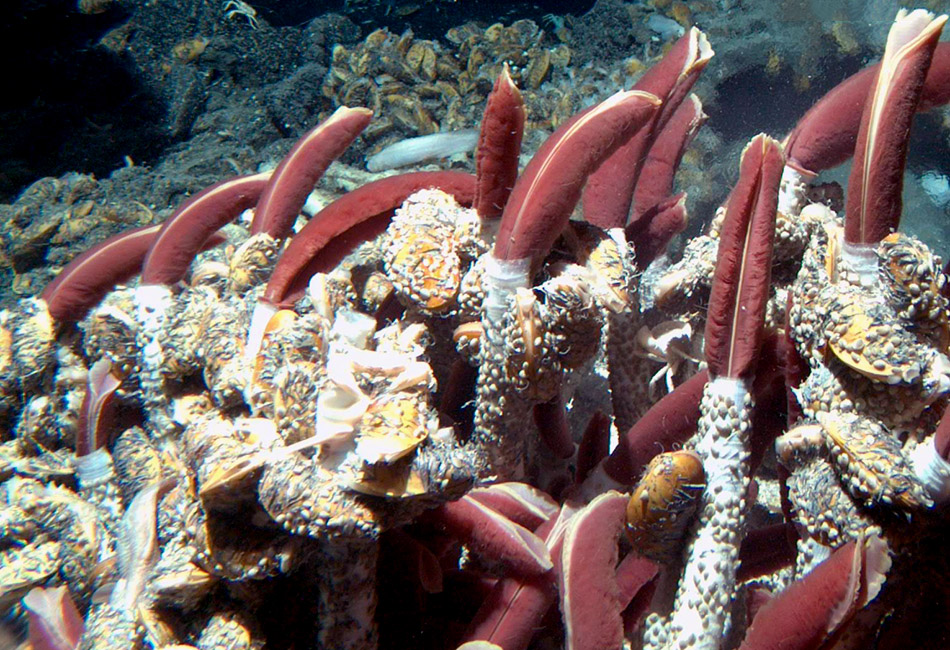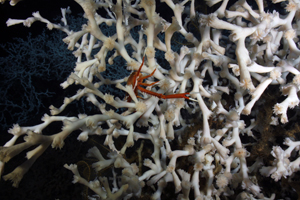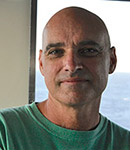Expedition 15:
Jan. 2 - 22, 2014
|
Hot Topics!
Vent Ecosystems 
You Feed Me, I Feed You: Symbiosis An Unexpected EventJanuary 20, 2014 (posted January 21, 2014) Before I left on this expedition, cruise veterans gave me some sage advice: At sea, you should expect the unexpected. On the 2011 Dive and Discover cruise, within 24 hours of leaving port, Atlantis had to make a sudden detour to rescue 93 Egyptians whose rickety fishing boat was taking on water. On other expeditions, crew members have dealt with equipment failures. Missed milestones in their families’ lives. Even lost loved ones back home. When you’re working at sea, the knowledge that shore is hundreds—sometimes thousands—of miles away is part of the job, along with demanding schedules and the feeling of the deck gently swaying underfoot. At times, we’ve fallen into the rhythm of life on the ship, and the distance from land has faded somewhat in our minds. This past Saturday night, all of us got a fresh reminder of our isolation. The NewsStefan Sievert’s face was blank with shock, and his voice flat. “I just found out that we’ve had a medical emergency. We’re stopping the cruise,” he told me, before rushing out of the room to spread the news to the rest of the science team. One person aboard the Atlantis has fallen ill, and the care required to handle the ailment is beyond what we can do here on the ship. Captain Allan Lunt made the final decision: We would pull up Jason, recover the Large Volume Pump, and head immediately to the closest port. The ship, which for the last two weeks bobbed peacefully in the water over the East Pacific Rise, fired up its engines and headed full speed into the waves. “That’s the kind of call you never want to get,” said Tito Collasius, who was one of the first to know about the situation when the phone rang in the Jason van. “You’re suddenly rushing to get things off of the sea floor, and start moving as quickly as possible, because you know someone is hurting.” For Sievert, the phone call was an immediate reality check. “It’s amazing how something like this makes you realize what really matters,” he said. “Five minutes earlier, our biggest concern was whether we could move a temperature sensor at a vent site a couple of inches in one direction or the other.” As the news spread among the crew and scientists, many gathered in the mess deck, speaking in hushed tones. Others rushed to make satellite calls home, or send emails to family. Late in the evening, ordinary Seaman Richie Barnes camped out in the ship’s computer lab with a somber expression. “This job isn’t for everybody,” he said while typing out messages to friends. “The isolation can be hard on you sometimes. Something like this happens, and you want to make sure everything is okay back at home. It’s tough to go to sleep again until you do that.” Full Speed AheadFor the next two days, Atlantis plowed headlong through rough water, pitching and rolling sharply. Walking in a straight line became nearly impossible, and for some, even sleeping was a challenge. In a situation like this, though, comfort takes a back seat. Speed is of the essence. When a medical emergency happens at sea, Chief Mate Mitzi Crane is our first responder. She’s a trained EMT and the ship’s medical officer. If need be, she says, she’s a phone call away from a team of doctors on shore who can help guide her. This time, she and the doctors ashore decided that while the situation wasn’t life-threatening, it still needed urgent attention at a hospital back on land. So we immediately set sail for Acapulco, Mexico, the closest major city. “If Mitzi and the doctors recommend going in, we do. You don't argue with them,” Captain Lunt explained. The Slow RetreatAs the boat disappears into the distance, Atlantis starts a slow turn to starboard, and we begin our long trip back to Panama. The research cruise is over. Returning to the East Pacific Rise for a few more hours of sampling would involve several extra days of travel and would put the ship into Panama far later than expected. With that news, some of the researchers start breaking down their equipment. Others wind down their experiments. A mesh bag full of decorated styrofoam cups, which many of the scientists had planned to send to the bottom with the next elevator, sits on a table, untouched. There is still a lot to tell you about the work that was done on this cruise, though, so we will continue to post daily updates and interviews through the rest of this week. “This is not the way anyone would want to end a research cruise, but I’m not concerned about that right now,” said Sievert. “What matters most is that we’re getting our crew member the care he needs.” Get to know the crew
Lance Wills, able-bodied seaman on the Atlantis, has spent 30 years working on ships of all sorts, from fishing boats to research vessels. Over the years, he’s picked up plenty of good stories. He also picked up photography skills and a master’s degree in journalism. When he’s not standing watch on the bridge, Wills is often writing in his cabin and has penned several books here on the ship. Read the interview » [ Previous update ] [ Next update ]
|
Mailing List | Feedback | Glossary | For Teachers | About Us | Contact
© 2013 Dive and Discover™. Dive and Discover™ is a registered trademark of Woods
Hole Oceanographic Institution



